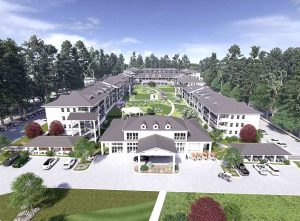Two Peachtree City Council Members are attempting to rectify the city government’s abuses in our property zoning system.
In December 2021, then-Mayor Vanessa Fleisch and then-City Council Members Mike King and Phil Prebor surprised the citizens of Peachtree City in their last city council meeting. Council Members Kevin Madden and Terry Ernst also voted in favor of the radical change and later lost their bids for re-election.
On their way out the exit, the Fleisch administration made a significant amendment to the Administrative Variance and Special Exception Variance ordinances (see: https://thecitizen.com/2023/06/27/council-makes-variances-easy-threatening-zoning-protections/).
The excuse for the lame-duck action was the claim that the number of variance public hearings would be greatly reduced (strange, why did the Fleisch administration wait until their last meeting to pass the changes then) before the city council. There has been no such reduction.
What did they do?
They combined the Administrative and Special Exception variance sections.
Additions and changes included:
• Limiting the maximum fence height increase to 25 percent
• Adding a requirement for written consent from adjacent property owners for the proposed setback reduction
• Adding a rear setback reduction of up to 50 percent with written consent from adjacent property owners
What is the significance?
Municipalities have zoning classifications for good reasons. First, they give property owners a reasonable expectation of what can be developed in the vicinity of their land. This aids in maintaining property values and prevents non-compatible uses adjacent to one another.
Second, zoning also creates a reliable building standard for subdivisions, shopping centers, and industrial developments and denotes their size and scope.
Third, zoning is the legal standard for real estate development and is defensible in the courts should a developer or landowner ever sue the municipality wanting to veer from the zoning requirements.
Administrative variances are supposed to be very rare. Circumstances for granting a variance are strict, calling for “extraordinary and exceptional conditions.” The landowner must prove that the extreme circumstances are peculiar to that piece of land alone.
Those stringent requirements for the Administrative and Special Exception variances have been ignored following the new version of the ordinance.
Our standards nosedive
Traditionally, Peachtree City was the state’s highest standard in zoning practices. At one time, the city forced developer John Wieland to pick up a house and move it back several feet because it did not meet the setback requirements. Administrative variances were used when someone was out of compliance by inches.
Regrettably, the Fleisch and Kim Learnard administrations have been letdowns regarding the variance issue. They handed them out like Halloween candy to just about anyone who asked for one. Learnard was dinged for granting variances that violated the Georgia Open Meetings Act and the Open Records Act (see: https://thecitizen.com/2023/07/24/councilman-calls-out-council-for-open-meetings-violations-gets-slammed-for-doing-it-in-public/).
The strict guidelines for granting a variance were being totally ignored (see: https://thecitizen.com/2023/07/10/opinion-if-city-oks-half-of-all-variance-requests-in-private-how-can-zoning-ordinance-survive/).
Legal issues abound when the city council does not follow the ordinances. Anytime a variance is granted in a zoning classification without meeting specific criteria in the ordinance, it opens Pandora’s box, leading to non-compliance issues, the inability to defend the zoning ordinances, and rejected variance applications going to court.
A judge could find that the ordinance requirements have been violated so often that they are practically invalidated.
The new ordinance also gives your next-door neighbors “quasi-governmental” authority over your property, which is a terrible idea.
Obviously, your neighbor was not elected or appointed to make zoning or variance decisions and should not be involved in them.
Like anyone else, neighbors can voice their opinions to government officials at government meetings during the public hearing. Still, they should not play a part in casting the official decision-making process in the ordinance. The variance either meets the criteria within the ordinance or does not, regardless of what the next-door neighbor thinks.
Learnard supports giving your next-door neighbors governmental authority over your application.
What is the purpose of zoning ordinances if the city council will give away whopping rear setback reductions of up to 50 percent? That change was shocking. It essentially tells someone who purchased the wrong home, with too small a lot to meet their needs, not to worry about the zoning and to build whatever they want even though their neighbors are abiding by the zoning standards.
In a past column, I list the recommended fixes for the variance ordinance change debacle (see: https://thecitizen.com/2023/07/10/opinion-if-city-oks-half-of-all-variance-requests-in-private-how-can-zoning-ordinance-survive/).
Heading back in the right direction
Council Members Clint Holland and Suzanne Brown have raised the alarm over the changes to the variance ordinances. Holland has requested action to return the variance issue to rare and transparent.
While Holland and Brown understand the problem, the remaining three city council members hesitate to correct previous errors.
The liberal issuance of variances, now of up to 50 percent of a setback, by the most recent city councils, threatens to wreck the standards that underpin the planned community.
Learnard said, “I am not interested in changing the 50 percent.” But then she waffled, “However, if the majority of Council or the Planning Commission think this should go to 25 percent I would support that.” Yet, she offers no justification for either generous allowance.
Council Member Frank Destadio wanted the percentage of setback encroachment allowed reduced to 10 percent. He offered no justification for his determination either.
There is a reason the city has been so stringent on variances over the decades BECAUSE ZONING IS THE FOUNDATION OF ALL OUR PLANNING AND DEVELOPMENT!
So, what changes?
Council Members Holland and Brown are asking that administrative variances be returned to their original intent of addressing minor non-compliance issues (see: https://peachtreecityga.portal.civicclerk.com/event/2154/files/report/374).
So, instead of handling a massive 15 to 50 percent setback variance outside of a city council meeting, Holland and Brown want anything over two feet out of compliance to be placed on the agenda of a city council meeting. That is neat, transparent, non-controversial, and resembles the process used for prior decades.
Learnard dislikes having large variance hearings in front of a larger audience available on internet broadcast at a city council meeting. However, that is doing the public’s business in public, as it should be.
As you might have guessed, Learnard and Council Members Laura Johnson and Frank Destadio want to keep most of those variance proceedings in the non-descript variance committee meetings that do not appear on the city’s website meeting calendar and are not broadcast. That’s poor, non-transparent government.
Holland asks that the staff planning director not be allowed to vote on variances. This makes perfect sense as the planning director does not have a vote on related issues like rezonings, annexations, modifications to zoning, or any other matter.
The current planning director also appears to dislike our planned community village model, preferring a more urbanized model (see: https://thecitizen.com/2023/08/21/planning-department-warring-against-long-standing-peachtree-city-plan/). So, what is the incentive to allow her to vote as an unelected staff member?
Cailloux has agreed with then-Mayor Fleisch and current Mayor Learnard when they told citizens that radical land planning change is necessary because they say so (see: https://thecitizen.com/2020/11/01/lci-meeting-insult-to-peachtree-city-residents/). That approach has faced considerable opposition.
Learnard said, “[To] leave the planning director out of the equation would be a mistake, as it would eliminate the single most knowledgeable source of information on the issue at hand.”
But no one has said the planning director should be absent from the proceedings and eliminate her opinion, only that she cannot vote. The director acts in this mode for every other planning matter before the planning commission and city council, offering her opinion.
What’s the damage?
In her chart to the Peachtree City planning commissioners, Cailloux reduces the firm ordinance requirement of a variance approval if there are “extraordinary and exceptional conditions” (which is why variances should be very rare) to a watered down, “Will not cause a substantial detriment to other property owners in the surrounding area; would not impair the purposes of the zoning ordinances.”
How can a sizable variance with no extraordinary and exceptional conditions peculiar to the specific property not impair the zoning ordinances? Those subjective decisions are an invitation for legal challenges regarding enforceability and the erosion of our zoning classifications.
Regrettably, Cailloux failed to provide the ordinance text before the suspect 2021 changes for the planning commissioners to review.
A taxpaying citizen should be able to plead their application for a variance before the city’s elected body and not two non-elected bureaucrats who get to decide what “substantial detriment” means in each case.
As you might have guessed, Learnard, Johnson, and Destadio want to keep Planning Director Cailloux on the variance committee and allow her to vote on them.
For her part, Learnard supports nearly every facet of the existing harmful ordinance, no surprise. Keep in mind that she adjudicated most of the variance requests under the new ordinance herself with the planning director and city manager behind closed doors, with no official committee meeting notice or official minutes on actions taken.
Johnson is still a blank slate on most government issues. She offered only one comment regarding the proposed changes, copying one of Learnard’s statements verbatim.
Holland and Brown made an excellent case for returning the administrative variance process to the format used for decades for minor non-compliance issues. The revised 2021 ordinance allows excess encroachment, is subjectively enforced, and has proved very controversial.
Conclusion
The flimsy rationale for changing the administrative ordinance in 2021 is that the number of variance public hearings at city council meetings would be reduced. The opposite has occurred.
Keep in mind that it’s the job of the city council to have such public hearings conducted in the city council meetings.
In fact, the city councils of the Fleisch and Learnard administrations have gotten so loose on enforcement of the code of ordinances regarding zoning that a dangerous “anything goes” mentality has taken hold. Nearly everything gets approved.
A process formerly used when a builder accidentally encroached on a zoning setback area by a matter of inches to a couple of feet has been perverted to give away anywhere from 10 to 50 percent of the official zoning setback. It’s disgraceful.
The building inspector must create a citation acknowledging that a four-inch encroachment is still a violation of the code. To handle these tiny infringements, the administrative variance process was used.
Upon review, the 2021 changes removed some significant requests for setback encroachment that should unquestionably appear before the entire city council and hid those applications for review in a small room in City Hall out of public view to be decided by two non-elected staff members.
Recently, Council Member Brown spoke about serving on the administrative variance committee as the council representative who adjudicates an administrative variance application.
Brown noted that the paperwork was not in order, critical information was missing, and the applicant did not offer a substantial reason for the variance. Nonetheless, the variance request passed 2 to 1, with the non-elected city manager and planning director voting to approve it anyway. The system has run amuck.
What is the consequence?
It’s not a coincidence that both former Mayor Fleisch and Learnard mention their desire to change our long-standing family-oriented development patterns in their State of the City addresses.
Unfortunately, they want the same stacked urban multi-family housing complex development style that Fayetteville is pursuing (see https://thecitizen.com/2023/03/21/opinion-mayor-council-taking-us-in-direction-we-wont-like/).
The rules keep getting more relaxed. Peachtree City was once the national standard for planned communities. The high standards are waning as the city council allows our zoning categories to erode.
Routinely giving away 10 to 50 percent of an officially codified setback with no justification eventually renders our zoning ordinances, the foundation of our development patterns, unenforceable and indefensible.
It’s a pivotal moment. Let’s hope the city council takes the appropriate action and restores the administrative variance process back to tiny encroachment violations of no more than a couple of feet.
[Brown is a former mayor of Peachtree City and served two terms on the Fayette County Board of Commissioners. You can read all his columns by clicking on his photo below.]











Leave a Comment
You must be logged in to post a comment.